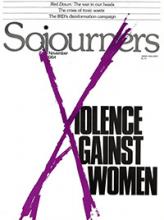I must begin with a confession—one that perhaps many of us could make. We want so much for the world—and ourselves—to be different, that we try to arrive at change without walking the path of solidarity and suffering that it takes to get there. We are sometimes able to break through and touch the pain of others, but that touch seems easier if their pain does not relate to our own—if we can keep our distance.
Middle-class white women face the temptation to see the economic and educational advantages into which we have been born as tools for success in a male-defined world. We are uncomfortable with the weakness and marginality that mark the history of women as well as the lives of many of the women we have known. We can become determined to distance ourselves from their powerlessness, to cultivate gifts for success, to prove ourselves different.
Such was part of my journey. I had developed sympathy—but not empathy—for the victims of an oppression that is both very subtle and often cruelly blatant.
Putting together this issue on violence against women has been personally healing for me and all of us at Sojourners. It began for me many months ago at 11 o'clock on a Saturday evening when I picked up a book titled I Never Told Anyone. The book is a collection of writings by women survivors of child sexual abuse.
The book offers page after page of recounting and reflection on the vulnerability of young girls and the violence that is forced on them—from infants to teenagers, from uncomfortable touches to acts of brutal sexual torture.
I could not stop reading until I finished it. And then I could not sleep. I needed to take time to feel the pain and anger, to grieve and pray and weep.
Read the Full Article

